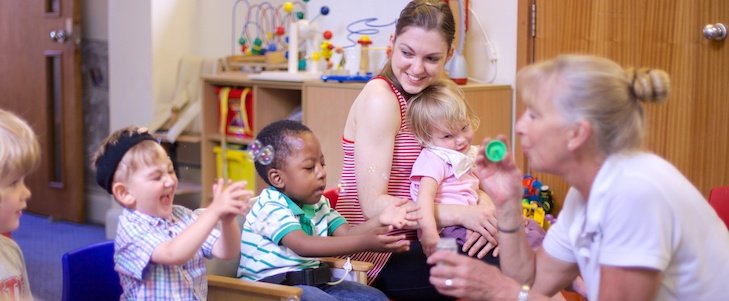What are Special Educational Needs (SEN)?
Special Educational Needs (SEN) is a term used to describe children who require additional support in their learning due to a physical or mental disability, a behavioural or emotional difficulty, or a specific learning difficulty. Early Years SEN refers to SEN support provided to children in their early years, from birth to the age of five.
In this article, we will explore what Special Educational Needs are, how they are identified and supported in early years, and the policies and guidelines that childcare providers must follow.

What are Special Educational Needs?
Children with special educational needs may have a range of needs that require extra support, including physical or mental disabilities, behavioural or emotional difficulties, or specific learning difficulties.
Physical disabilities can include conditions such as cerebral palsy, visual or hearing impairments, and mobility issues. These disabilities can impact a child’s ability to access the curriculum or participate in activities that other children can do easily. Children with physical disabilities may require accommodations such as assistive technology, adapted materials, or accessible classrooms and facilities.
Mental disabilities can include conditions such as autism, Down syndrome, and intellectual disabilities. These disabilities can impact a child’s cognitive and social development, making it more challenging to access the curriculum or interact with peers.
Behavioural or emotional difficulties can include conditions such as attention deficit hyperactivity disorder (ADHD), anxiety, or depression. These difficulties can impact a child’s ability to learn and interact with peers, making it challenging to access education and achieve their full potential. Children with behavioural or emotional difficulties may require accommodations such as counseling, therapy, or behaviour management strategies.
Specific learning difficulties can include conditions such as dyslexia, dysgraphia, or dyscalculia. These difficulties can impact a child’s ability to read, write, or do math, making it more challenging to access the curriculum and keep up with their peers. Children with specific learning difficulties may require accommodations such as specialized instruction, assistive technology, or alternative assessments.
Early Years Special Educational Needs (SEN)
Early Years SEN refers to the support provided to children with Special Educational Needs (SEN) in their early years, from birth to the age of five. The early years are a critical period for a child’s development, and providing early intervention and support can have a significant impact on their future success.
The Early Years Foundation Stage (EYFS) is the framework that sets the standards for the learning, development, and care of children in their early years. All childcare providers, including nurseries, preschools, and childminders, must follow the EYFS and provide SEN support to children who require it.
Early Years SEN support can take many forms, depending on the child’s individual needs. It may include assessments to identify areas of need, individualized education plans, and specialized instruction or therapies.
Early Years SEN support may also involve working closely with parents and families to provide support and guidance at home.
The role of early years practitioners is crucial in identifying and supporting children with SEN. Early years practitioners should have an understanding of the range of SEN and be able to identify children who may require additional support. They should also be able to provide appropriate support and work closely with other professionals, such as speech and language therapists or occupational therapists.
Early Years SEN support is essential for ensuring that all children have an equal opportunity to succeed and reach their full potential. By providing early intervention and support, children with SEN can develop the skills and abilities they need to succeed in school and in life. It is crucial that early years practitioners are trained and supported to provide effective SEN support, and that parents and families are involved in the process to ensure the best outcomes for children.
Identifying Special Educational Needs in Early Years

Identifying Special Educational Needs (SEN) in early years is essential for ensuring that children receive the appropriate support and resources they need to succeed. Childcare providers, including nurseries, preschools, and childminders, have a crucial role to play in identifying children who may have SEN.
Observation is one of the primary methods used to identify children with SEN. Childcare providers should observe children’s behaviour, development, and progress to identify any areas of concern. For example, a child who is not meeting developmental milestones or who has difficulty communicating with others may require additional support.
Assessment is another important tool for identifying children with SEN. Childcare providers may use standardized assessments or observations to identify children who may have specific learning difficulties, such as dyslexia or autism. Assessment should be done in a way that is sensitive to the child’s needs and takes into account cultural and linguistic differences.
Consultation with parents and other professionals is also crucial in identifying children with SEN. Parents know their children best and can provide valuable information about their child’s development and behaviour. Other professionals, such as health visitors or speech and language therapists, may also be involved in the child’s care and can provide valuable insights and recommendations.
Once a child has been identified as having SEN, the childcare provider should work with the child’s parents and other professionals to develop a SEN support plan that meets the child’s specific needs. This plan should include specific goals and strategies for supporting the child’s learning and development. Regular monitoring and review of the support plan are also essential to ensure that the child is making progress and receiving the appropriate support.
SEN Policy and Guidelines for Early Years
Having a Special Educational Needs (SEN) Policy is essential for childcare providers to ensure that they can effectively identify and support children with SEN. The SEN Policy should outline how the childcare provider will identify, assess and support children with SEN, including the specific strategies, resources and interventions that will be used.
The SEN Policy should also include information on how the childcare provider will involve parents in the SEN process, including regular updates on their child’s progress and involvement in decision-making about their child’s support. It should also outline how the childcare provider will work with other professionals, such as health visitors, therapists, and social workers, to provide coordinated support for children with SEN.
The SEN Policy should be regularly reviewed to ensure that it remains up-to-date and effective. This may involve reviewing the effectiveness of interventions, assessing the outcomes of support, and updating strategies and resources as needed.
In addition to having a SEN Policy, childcare providers must also follow the SEND Code of Practice. This is a legal requirement that sets out the procedures that childcare providers must follow to identify and support children with SEN. The Code of Practice outlines the responsibilities of childcare providers, local authorities, and other professionals in supporting children with SEN.
The Code of Practice emphasizes the importance of early identification and intervention for children with SEN and encourages a collaborative approach to support. It also emphasizes the need for effective communication and regular review of support to ensure that children receive the appropriate support and resources they need to succeed.
Making an Early Years SEN Referral

How to make an early years referral?
All early years practitioners should be aware of how to make an early years inclusion (SEN) referral.
The exact process of making a referral will be specific to your local early years team.
You can find out who your local council’s early years team is and their website by clicking the link below and entering your postcode.
Find out your local early years team
A referral is usually made by your settings Special Educational Needs Coordinator (SENCO).
Though, in order to make a referral it is important to gather as much evidence about the child, via observations, IEP’s, tracking and any other relevant documents.
Before making a referral it is important that you can show that you and the parent has done everything possible to develop the child, and have been wholly unsuccessful.
It is important to note that you must get parent’s written permission in order to make a referral. This is why creating those partnerships early is so important, as you can make parents aware early on of and possibly share any concerns you have.
After the referral has been made someone from an outside agency such as portage, IDS, speech and language or relevant agency will make a visit to the setting or offer support groups/strategies depending on the concern and agency contacted.
SEN Learning in Early Years
SEN support in early years can take many forms, including individualised learning plans, additional resources, and specialist support from outside professionals. The aim is to provide children with the support they need to access education and achieve their full potential. Children with SEN may require extra support in areas such as communication, social interaction, and physical development.
Having policies and procedures in place for Special Educational Needs (SEN) is essential for childcare providers to ensure that children with SEN receive the appropriate support and resources. These policies and procedures should cover how SEN is identified, how support is provided, and how progress is monitored.
One resource that childcare providers can use to develop policies and procedures for SEN are the templates provided by openanursery.co.uk.
You can also get guidance on developing policies and procedures that meet the standards set out in the Early Years Foundation Stage (EYFS) framework, including policies and procedures for SEN in the nursery policies an procedures article.
It emphasises the importance of having clear policies and procedures in place to ensure that all children receive high-quality care and education. It also provides practical tips and examples for developing policies and procedures that are tailored to the needs of your setting.
By following the guidance provided in this article and developing robust policies and procedures for SEN, childcare providers can ensure that they are meeting the needs of all children in their care and providing a safe and inclusive environment.
Inclusive Practice and Early Years SEN
Inclusive practice is an essential aspect of providing support for children with Special Educational Needs (SEN) in the early years. Inclusive practice means creating an environment where all children feel valued, respected, and supported, regardless of their background or ability. This includes providing appropriate resources and support to help children with SEN access education and achieve their full potential.
Conclusion
In conclusion, Special Educational Needs (SEN) refer to children who require extra support in their learning due to a range of factors, and Early Years SEN refers to the support provided to children with SEN in their early years. Childcare providers must follow the EYFS and have a SEN policy in place that outlines how they will identify and support children with SEN. By working together with parents and other professionals, childcare providers can provide the necessary support to help children with SEN access education and achieve their full potential.



